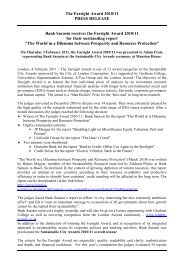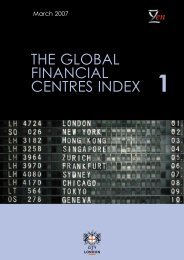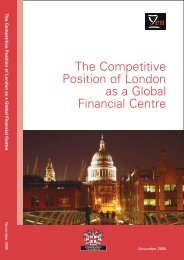The global financial centres index (GFCI) 3 - Z/Yen
The global financial centres index (GFCI) 3 - Z/Yen
The global financial centres index (GFCI) 3 - Z/Yen
Create successful ePaper yourself
Turn your PDF publications into a flip-book with our unique Google optimized e-Paper software.
<strong>The</strong> Global Financial Centres Index<br />
Foreword<br />
Michael Snyder<br />
Chairman, Policy and Resources Committee, City of London<br />
<strong>The</strong> Global Financial Centres Index 3 (<strong>GFCI</strong> 3) is the third report produced by the<br />
Z/<strong>Yen</strong> Group for the City of London which ranks <strong>financial</strong> <strong>centres</strong> based on external<br />
benchmarking data and current perceptions of competitiveness. Previous <strong>GFCI</strong><br />
reports, and other City of London commissioned research, such as <strong>The</strong> Impact of<br />
Taxation on Financial Services Business Location Decisions, show that international<br />
<strong>financial</strong> services firms, and the talented staff that they employ, are both highly<br />
mobile and responsive to a range of both market and non-market factors. <strong>The</strong>se<br />
factors are important to policy makers looking to maintain or improve the<br />
competitiveness of their markets.<br />
<strong>GFCI</strong> 3 shows that, as in the case of <strong>GFCI</strong> 1 and <strong>GFCI</strong> 2, London and New York are the<br />
leading <strong>global</strong> <strong>financial</strong> <strong>centres</strong>, with London continuing to be ahead but by a smaller<br />
margin than in the previous report. This reflects as before the excellent access of<br />
London to markets, skilled staff and a proportionate regulatory regime. With the<br />
Financial Services Action Plan being rolled out across Europe we are seeing a<br />
progressive and welcome reduction in market barriers to international <strong>financial</strong><br />
services. In this context, infrastructure and taxation are likely to be even higher on the<br />
list of competitive factors influencing the perceptions of individuals employed in <strong>global</strong><br />
firms. On these measures London’s lead is being squeezed and there is no room for<br />
complacency if we are to safeguard and improve the resilience and competitiveness<br />
of this <strong>financial</strong> centre.<br />
Since the publication of <strong>GFCI</strong> 2, the collapse of the sub-prime mortgage market in the<br />
US, the subsequent write down of US mortgage-backed <strong>financial</strong> products, and the<br />
dissemination of the associated credit shock and liquidity crisis through the <strong>global</strong><br />
<strong>financial</strong> system via securitised debt products have shown that international <strong>financial</strong><br />
markets are highly interdependent and strongly linked to the real economy. In this<br />
connection it is also worth noting the increased attention that is being paid to the role<br />
of the emerging markets of China, India and Brazil.<br />
As in previous reports, the evidence gathered in <strong>GFCI</strong> 3 reflects the inputs by <strong>financial</strong><br />
services respondents and I would encourage professionals around the globe to<br />
participate in the ongoing survey at www.cityoflondon.gov.uk/<strong>GFCI</strong><br />
Michael Snyder<br />
City of London<br />
March 2008<br />
1











